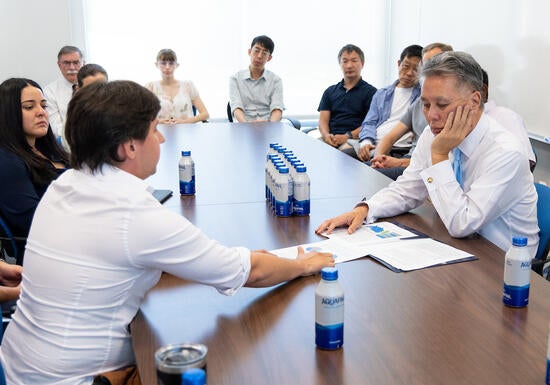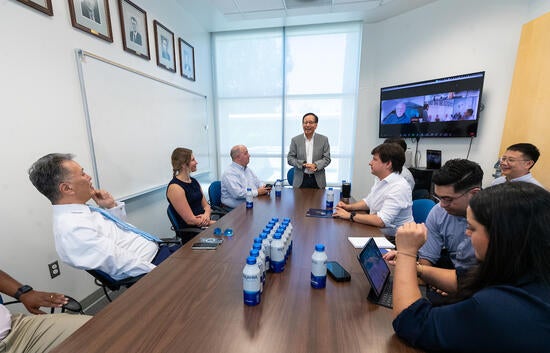Rep. Mark Takano, D-Riverside, visited UC Riverside on August 6 to learn about the new Experimental Cosmology Center in the Department of Physics and Astronomy. The center, spearheaded by Nobel laureate Barry Barish, a distinguished professor of physics and astronomy, was launched earlier this year.
The center will design equipment for experiments at the forefront of cosmology and train students to lead these experiments. It will encompass a broad range of subjects in fundamental physics, with a focus on experimental cosmology, gravity/gravitational waves, and particle astrophysics.
Richard Seto, vice chair of the Department of Physics and Astronomy, introduced several faculty members and an undergraduate student to the congressman and his staff. Barish, who joined the meeting via Zoom, then gave a presentation on the center.
“I think there’s a real opportunity for us to create something rather special that will bring leading science to Riverside, with a lot of side benefits that will be very good for the community and the university,” Barish said. “This particular initiative is built around developing forefront technologies, which often have very large impacts in other ways, either commercially or in the other sciences. What we can build at UC Riverside is quite unique and, scientifically, can amount to many breakthrough developments in technology.”
Barish said the department had hired three new faculty members who will conduct research at the center: Jonathan Richardson, who specializes in gravitational waves; Shawn Westerdale, who works on dark matter; and Steve Choi, who focuses on understanding how the universe began.
Westerdale discussed with Takano some of the needs of the center, such as equipment, facilities, and personnel. Besides securing funding, the center’s goals, he said, include developing the next generation of instruments and training scientists who will design them.

“Everyone in the department is coming together to work on these goals,” he said.
“That includes people doing material and atomic physics, people who are developing semiconductor and quantum technology, and people doing nuclear physics and astrophysics. It’s an example of the sort of multidisciplinary research we’re already doing.”
Takano said he was pleased that UCR physicists were thinking about how they will develop the next generation of scientists and technicians who are invested in basic science.
“My hope is we can try to convince some of my colleagues that global competitiveness means investing in basic science,” he told the physicists attending the meeting. “I've always been a big believer in it. I've got a team that believes in it, and we certainly want to align with what you're doing.”
Addressing Takano, Peter Atkinson, the interim dean of the College of Natural and Agricultural Sciences, said the Experimental Cosmology Center is “a great example of bringing good science to the Inland Empire and making this university known for the expansion of knowledge.”
“You're hearing about this great opportunity in physics, but it also spreads across other departments in our college,” he said. “This is a fantastic place to grow science and to train and teach local kids how to do great science and be great scientists. My commitment as dean is to enable this as much as I can.”
